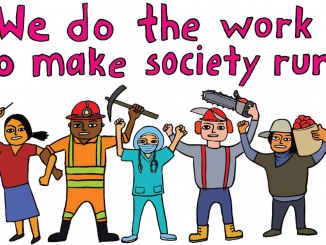
About 150,000 U.S. workers in the multinational auto industry don’t have a union. That’s about equal to the number of autoworkers represented by the United Auto Workers (UAW), although the number of non-union autoworkers is higher if those working at parts plants are included. Most of the non-union plants owned by overseas-based companies like Volkswagen (VW), Honda and Toyota, the so-called “transplants” because their bosses are located overseas, are in southern States. The vote by 61% of the 4,326 of the VW workers in Chattanooga to have the UAW represent them is the first success in organizing the non-union auto plants in the South in more than 40 years. The next challenge is winning big gains in the first contract: establishing better benefits, higher wages, and workers’ rights on the job.
Non-union auto plants generally pay from 10% to 20% less than unionized ones, which makes these plants more profitable than unionized ones, and the health and retirement plans at non-unionized plants aren’t as good as those most UAW members have. Under the UAW contract negotiated in October 2023 after a six-week strike, top pay for autoworkers working for Ford, GM and Chrysler/Stellantis will be at least $42 per hour by 2028, way more than top pay at VW. The VW plant in Tennessee builds cars both for sales in the U.S. and also for export. VW made $24 billion in profits worldwide and it can certainly afford to match what UAW members already make, if not do better.
After the U.S.-based auto companies agreed to big wage increases, VW announced an 11% pay increase in the hope that this would diminish support for unionizing. However, when VW workers discovered that the VW bosses had also boosted co-pays for health benefits, support for the UAW grew instead of declining. Abusive working conditions also help explain why workers voted union. One UAW supporter told the press, “It’s really hard to build a quality product when all you’re doing all day long is thinking about how bad your shoulder hurts, or how bad your feet hurt, or how bad your knees hurt.”
Pro-union VW workers won the vote in part because they built a large in-plant organizing committee with representatives from 90% of the plant’s departments and all shifts. Past efforts to unionize the plant failed for many reasons, but mainly because the UAW officials failed to encourage worker-to-worker organizing in the plant. Now, rank-and-file auto workers need to maintain in-plant organization to make sure that the demands of the workers are firmly asserted at the bargaining table by UAW negotiators.
UAW officials hope the victory at VW previews successful organizing drives at Honda, Toyota and Nissan. These transplant companies operate at least 29 plants in the U.S., mostly in Southern States where they can count on the state governments to help them fight to keep the plants non-union. Keeping unions out is part of the bosses’ strategy to maintain the low wages in the South, which drags down wages throughout the country as a whole.
The problems auto workers face in the South are not because most of the companies are transplants. U.S.-based Tesla, owned by Elon Musk, is even more ferociously non-union than the transplants. Profit-mad corporations are the same across the world. That’s the nature of capitalism.




